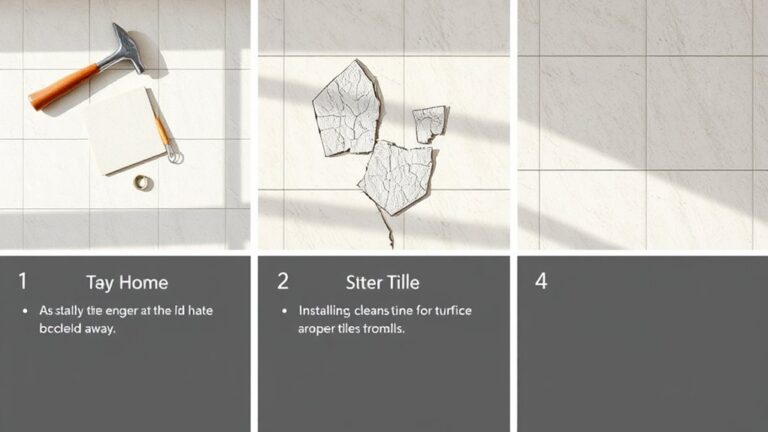To get rid of carpet odors, start with baking soda. Sprinkle it generously on your carpet and let it sit for at least 15 minutes before vacuuming. You can also mix equal parts white vinegar and water in a spray bottle, mist your carpet lightly, and blot it afterward. For a unique twist, coffee granules can absorb stubborn smells overnight. Don't forget about essential oils; they can help purify the air while adding a pleasant scent. Finally, consider professional cleaning for persistent odors. You'll want to explore other natural methods for a fresher home atmosphere too.
Baking Soda Techniques
When it comes to tackling stubborn carpet odors, baking soda is one of the best natural solutions you can use. This simple yet powerful ingredient excels at neutralizing alkaline odors, making it particularly effective against various smells, including those pesky pet and food-related odors.
To use baking soda as a carpet deodorizer, start by sprinkling a generous layer over the affected area. The key is to let it sit for at least 15 minutes, but ideally, overnight. This allows the baking soda to deeply penetrate the carpet fibers, where it can effectively absorb moisture and odors.
Once the designated time has passed, vacuum the area thoroughly. This step is essential, as it removes the baking soda along with the absorbed odors, leaving your carpet smelling revitalized and inviting. For persistent odors that linger, don't hesitate to reapply the baking soda. It's a safe and effective method for deep cleaning your carpets over time.
If you want to enhance its deodorizing properties, consider combining baking soda with essential oils or even a bit of vinegar. These additions can leave your carpet not only odor-free but also infused with a pleasant scent that elevates your living space. So, when it comes to renewing your home, using baking soda techniques is a practical, straightforward approach you can trust.
Vinegar Solutions
If you're looking for a natural way to tackle carpet odors, vinegar solutions are a great option. By mixing equal parts white vinegar and warm water in a spray bottle, you can create an effective misting application that neutralizes smells without leaving any residue. Just lightly mist the carpet, let it sit for a few minutes, and watch as the vinegar's scent fades away, leaving your carpet refreshed.
Vinegar and Water Mix
Over time, carpets can absorb a variety of odors, but a simple vinegar and water mix offers an effective solution for neutralizing those unpleasant smells. This natural solution is easy to make—just combine equal parts vinegar and water in a spray bottle. The acetic acid in vinegar acts as a disinfectant, tackling odor-causing bacteria without leaving any residue once it dries.
To use it, lightly mist the affected area of your carpet and let the solution sit for a few minutes. Afterward, blot the area with a clean cloth to absorb the moisture. You'll notice that the strong vinegar scent dissipates as it dries, typically within a few hours, leaving your carpet smelling fresher without harsh chemicals.
If you're dealing with particularly stubborn odors, consider adding baking soda to the mix. When combined, they create a fizzing reaction that enhances the deodorizing power, making it even more effective in combating carpet smell. After the fizz settles, simply vacuum up the residue for a fresher, cleaner carpet. This method is not only effective but also empowers you to maintain a pleasant environment at home.
Misting Application Technique
The misting application technique is a straightforward and efficient method for using vinegar solutions to combat carpet odors. To create your vinegar solution, mix equal parts of white vinegar and warm water in a spray bottle. This concoction is effective for neutralizing unpleasant smells that can linger in your carpets.
When applying the solution, lightly mist the carpet without oversaturating the fibers. Oversaturation can lead to water damage or mildew growth, so a gentle approach is key. After misting, allow the treated area to sit for a few minutes. This gives the vinegar time to break down the odor-causing particles.
Once you've let the solution work its magic, take a clean cloth and blot the area. This step helps absorb excess moisture and odors, enhancing the effectiveness of your vinegar solution. As the vinegar scent dissipates during air drying, you'll be left with a fresh smell that's perfect for tackling odors from spills, pets, or dampness. By employing this misting application technique, you're taking a proactive step towards maintaining a cleaner, fresher carpet.
Residue-Free Drying Process
Achieving a residue-free drying process with vinegar solutions is essential for maintaining the integrity and appearance of your carpets. To create an effective vinegar solution, mix equal parts white vinegar and water. This mixture not only neutralizes odors but also avoids any residue left behind, ensuring your carpets remain fresh and clean.
When applying the vinegar solution, you should lightly mist the affected area instead of soaking it. Excess moisture can lead to mold growth, which you definitely want to avoid. After misting, let it sit for a few minutes to enhance its odor-eliminating properties. As the vinegar dries, its strong vinegar scent dissipates, leaving behind a fresh aroma.
For even better results, consider combining vinegar with baking soda before application. This mixture creates a fizzing reaction that helps break down odor-causing particles, making it easier for you to vacuum afterward. By following these steps, you can effectively remove carpet odors while ensuring a residue-free drying process that keeps your carpets looking their best. Enjoy the freedom of a fresh-smelling home without any lingering residue!
Essential Oils Benefits
Harnessing the power of essential oils can greatly enhance your carpet cleaning efforts, making it easier to tackle stubborn odors. These natural wonders do more than just smell good; they also provide various benefits that can transform your living space. Here are three key advantages of using essential oils in your carpet cleaning routine:
- Antibacterial Properties: Essential oils like lavender and eucalyptus can help purify indoor air by eliminating bacteria and germs, ensuring your carpets remain fresh and clean.
- Neutralizing Unpleasant Smells: When combined with baking soda, essential oils can enhance odor absorption, effectively neutralizing unpleasant smells trapped in carpet fibers. This duo not only absorbs odors but also releases a revitalizing scent.
- Improving Indoor Air Quality: Unlike chemical-based cleaning products that often contain harmful volatile organic compounds (VOCs), essential oils are natural alternatives. Using them can considerably improve indoor air quality, making your home a healthier place to live.
Incorporating essential oils into your regular carpet maintenance not only helps combat odors but also creates a more inviting atmosphere. Their aromatic properties can positively influence your mood and reduce stress levels, allowing you to breathe easier and feel more at home. So, next time you're looking to refresh your carpets, consider the versatile benefits of essential oils. They're a simple yet effective solution for a cleaner, more enjoyable living environment.
Coffee Granules Usage
One of the simplest and most effective ways to tackle stubborn carpet odors is by using coffee granules. These granules have a strong aroma that not only masks but also helps eliminate bad odors in your carpets, making them an ideal choice for those musky or fusty smells that can linger. To get started, simply spread the coffee granules evenly over the affected area of your carpet.
Let them sit overnight to absorb odors effectively. This overnight process allows the granules to work their magic, drawing in and neutralizing those unpleasant smells. The next day, all you need to do is vacuum up the granules. You'll be left with a fresher scent in your home without any harsh chemical residues, making it a win-win for your space and environment.
If you're a coffee enthusiast, you'll appreciate that this method utilizes a common household item, which is both effective and eco-friendly. Plus, if you're feeling creative, you can even incorporate coffee granules into DIY candles, allowing you to enjoy their pleasant aroma while combating odors in multiple ways.
Natural Air Circulation
Natural air circulation is a powerful yet often overlooked method for combating carpet odors in your home. It can greatly improve indoor air quality by diluting and dispersing odor-causing pollutants, making your living space feel fresher and more inviting. Here's how you can harness the benefits of natural air circulation:
- Open Windows and Doors: Aim to open your windows and doors for at least 15-30 minutes a day. This allows fresh air to flow in and helps remove stale odors trapped in your carpets and furnishings.
- Use Fans: Ceiling fans or portable fans can enhance air movement in your space. They not only promote natural air circulation but also aid in evaporating moisture that can lead to unpleasant smells in your carpets.
- Incorporate Indoor Plants: Adding indoor plants like Snake Plants or Peace Lilies can beautify your home while promoting air circulation. These plants not only help purify the air but also work to mitigate carpet odors.
On sunny days, consider placing your rugs and cushions outside for a few hours. The combination of fresh air and sunlight will deodorize and refresh your fabrics, effectively reducing lingering odors. By embracing these natural air circulation methods, you can create a healthier, more pleasant environment, free from unpleasant smells and filled with the freshness you deserve.
Onion Odor Absorption
When it comes to combating stubborn carpet odors, you might be surprised to learn that onions can be your secret weapon. Known for their strong smell, onions contain sulfur compounds that effectively absorb and neutralize bad odors, making them a natural choice for odor removal in carpets and enclosed spaces.
To harness the power of onion odor absorption, simply cut an onion in half and place it in a bowl in the area affected by odors. This method works wonders, especially in places with stagnant air, like basements or storage rooms, where odors tend to linger. Leave the onion halves out for one to two days. As they absorb the surrounding odors, including mildew and musty scents often found in carpets, the onion's own pungent smell will dissipate.
This approach is particularly appealing for those seeking an eco-friendly solution. It requires no commercial cleaning products and is both cost-effective and simple to implement. You won't need to worry about harsh chemicals or complicated processes; just let the onion work its magic.
While unconventional, using onions for odor absorption offers a straightforward and natural way to combat bad odors in your home. So, if you're tired of dealing with lingering smells in your carpet, give this method a try. You might just find that the humble onion is exactly what you need to restore freshness to your living space.
Indoor Plants for Purification
Indoor plants like Snake Plants and Peace Lilies can greatly improve your home's air quality by removing harmful toxins and releasing fresh oxygen. These low-maintenance options not only enhance the environment but also help regulate humidity, which can prevent musty carpet odors. By incorporating a few of these plants, you can create a fresher space while effortlessly tackling unwanted smells.
Air Purifying Capabilities
Adding plants to your home can work wonders for air quality and help tackle those pesky carpet odors. Indoor plants aren't just pretty; they actively improve the air you breathe by filtering out harmful toxins and reducing unpleasant smells. They can transform your space into a fresher, healthier environment.
Here are three fantastic indoor plants that excel in air purifying capabilities:
- Snake Plant: Known for its ability to absorb formaldehyde and benzene, this hardy plant thrives on neglect, making it ideal for busy lifestyles.
- Peace Lily: This elegant plant not only adds beauty but also effectively reduces volatile organic compounds (VOCs) and enhances air freshness.
- Spider Plant: A champion at removing pollutants like carbon monoxide, the spider plant is easy to care for and quickly adds a vibrant touch to your indoor space.
Low Maintenance Options
Your home doesn't have to be a jungle to enjoy the benefits of air-purifying plants. Incorporating indoor plants like Snake Plants and Peace Lilies can greatly contribute to keeping your carpets smelling fresh. These plants absorb harmful toxins such as Formaldehyde and Benzene, helping to improve your indoor air quality naturally, without relying solely on cleaning products.
NASA's Clean Air Study highlights how certain houseplants can effectively purify the air, making them an ideal solution for getting rid of unwanted odors. What's even better is that these plants require minimal maintenance. Varieties like Boston Ferns thrive in low-light conditions and need little watering, making them perfect for busy lifestyles.
Adding these green companions not only beautifies your space but also contributes to odor control, enhancing both aesthetics and air quality. Plus, live plants can increase humidity levels, which prevents dry air that can exacerbate carpet odors. So, if you're looking for low-maintenance options to elevate your home's freshness, consider incorporating indoor plants into your decor for a practical and stylish approach to cleaner air.
Immediate Spill Management
When a spill occurs, quick action is essential to minimize the risk of stains and odors setting into your carpet. Effective spill management can help you keep that unpleasant smell out of your carpet and maintain your space's freshness. Here are three important steps you can take:
- Blot Spills Immediately: Grab a clean, dry cloth and gently blot the spill. Avoid rubbing, as that can damage the carpet fibers and push the liquid deeper. The goal is to absorb as much liquid as possible before it seeps into the carpet.
- Treat the Stain: For liquid spills, use club soda or a mild detergent mixed with water. Apply it with a cloth to lift the stain while making sure you don't overwet the area. This method can help you effectively manage the stain without leaving behind residues that attract dirt and odors.
- Rinse and Dry: After treating the spill, rinse the area with water and blot again to remove any cleaning residue. It's critical to confirm the carpet dries thoroughly afterward. Utilize fans or dehumidifiers to expedite the drying process, preventing mold and mildew growth that can worsen odors.
Professional Cleaning Options
Professional carpet cleaning options can make a significant difference in maintaining a fresh and odor-free environment in your home. If you're struggling with persistent odors from pet accidents or smoke smell, these services can tackle issues that DIY methods often can't resolve. Professional cleaners use advanced techniques like steam cleaning and hot water extraction to reach deep-seated stains and odors, ensuring a thorough clean.
Many companies also prioritize eco-friendly products, which not only eliminate unpleasant smells but also contribute to a healthier indoor environment by reducing the presence of harmful chemicals. With access to specialized equipment, such as industrial-grade vacuums and deodorizers, professionals can achieve results that far surpass standard home cleaning tools.
It's recommended to schedule professional carpet cleaning every 6-12 months to keep your carpets fresh and to prevent the buildup of dirt, allergens, and moisture that can lead to odors. Additionally, some services offer targeted treatments specifically designed for tough smells, like pet urine or smoke. These treatments often use enzyme-based cleaners or ozone technology to break down odor-causing compounds effectively.
Frequently Asked Questions
How Do You Get Rid of a Bad Smell in Carpet?
Ever walked into a room and been greeted by a musty carpet smell? You can tackle that odor head-on! Start by sprinkling baking soda on the affected area; it's a powerful carpet cleaning agent. Then, consider using odor neutralizers like essential oils mixed with water in a spray bottle. Just mist it lightly, and you'll refresh your space. Remember, a clean carpet leads to a fresher, more inviting home. Don't let odors linger!
How Can I Make My House Smell Good With Carpet?
To make your house smell good with carpet, start by sprinkling baking soda on the carpet and letting it sit for a few hours. It absorbs odors effectively. You can also mix a few drops of essential oils, like lavender or lemon, into the baking soda for a revitalizing scent. Additionally, consider using air fresheners or regularly cleaning your carpets to maintain a pleasant aroma throughout your home.
Will Bad Carpet Smell Go Away?
Imagine your carpet as a garden; neglect it, and weeds of odor will take root. Bad smells won't just vanish on their own. To combat them, embrace carpet maintenance tips like regular vacuuming and deep cleaning every few months. Identify common odor causes, like spills or pet accidents, and tackle them promptly. Incorporate odor prevention strategies, such as keeping your home well-ventilated, and you'll cultivate a fresh, inviting environment for all.
How to Get Throw up Smell Out of Carpet?
To get that vomit smell out of your carpet, start with immediate vomit stain removal by blotting the area. Next, use a mixture of equal parts water and white vinegar to clean the spot, letting it sit for a few minutes. Sprinkle baking soda for carpet deodorization, allowing it to absorb odors. For stubborn smells, try enzyme cleaners, as they're effective pet odor solutions that break down organic material, ensuring a fresh-smelling carpet.




